По мере роста стартапов им необходимо программное обеспечение, которое является гибким, масштабируемым и экономически эффективным, чтобы помочь им эффективно управлять своими проектами. В этом руководстве мы рассмотрим лучшее программное обеспечение для управления проектами для стартапов в 2026 году. Каждое из этих программных решений предлагает уникальные функции и преимущества, подходящие для стартапов.
Что такое программное обеспечение для управления проектами?
Программное обеспечение для управления проектами предлагает структурированный каркас для организации задач, управления ресурсами и соблюдения сроков. Эти инструменты помогают стартапам создать эффективный рабочий процесс, позволяя членам команды бесшовно сотрудничать, даже находясь в разных местах.
Основные функции программного обеспечения для управления проектами включают:
- Планирование задач: Обеспечивает организацию задач с четкими сроками, что облегчает назначение и управление работой для каждого члена команды.
- Распределение ресурсов: Помогает эффективно распределять ресурсы, такие как бюджет и человеческий капитал, чтобы предотвратить чрезмерное или недостаточное использование и обеспечить соблюдение бюджета.
- Отслеживание прогресса: Предоставляет обновления в реальном времени о статусе каждого проекта, позволяя менеджерам вносить корректировки по мере необходимости и поддерживать проекты в графике.
Преимущества программного обеспечения для управления проектами для стартапов
Использование программного обеспечения для управления проектами для стартапов может значительно улучшить способность оставаться в курсе задач и развиваться. Эти инструменты предоставляют несколько ключевых преимуществ:
- Улучшенное сотрудничество
- Улучшенное распределение ресурсов
- Масштабируемость
- Эффективность по времени и затратам
Как выбрать правильное программное обеспечение для управления проектами для вашего стартапа
Существует несколько факторов, которые следует учитывать при выборе приложений для управления проектами для стартапов:
- Соотношение цена-качество
- Возможности интеграции
- Простота использования
- Гибкость и масштабируемость
Лучшее программное обеспечение для управления проектами для стартапов в 2026 году
Мы решили начать с быстрой сравнительной таблицы, чтобы помочь вам быстро просмотреть самую важную информацию о каждом программном обеспечении для управления проектами для стартапов:
Программное обеспечение | Функции | Цены | Преимущества |
Worksection | Управление задачами, список дел, отслеживание времени, диаграмма Ганта, Канбан, календарь, отчетность, контроль доступа | От 3.4 долларов США за пользователя в месяц | Доступно, оптимизировано для стартапов, идеально подходит для управления несколькими проектами. |
Monday.com | Автоматизация рабочего процесса, отслеживание времени, интеграции | От 9 долларов США за пользователя в месяц | Настраиваемые рабочие процессы, масштабируется по мере роста вашего стартапа, визуальный интерфейс управления проектами. |
Asana | Отслеживание задач, временные графики, отчетность, интеграции с Google Drive/Slack | От 10.99 долларов США за пользователя в месяц | Отлично подходит для управления задачами, бесшовное сотрудничество, легкая интеграция с другими популярными инструментами. |
Trello | Система доски Канбан, интерфейс перетаскивания, настраиваемые карточки | От 5 долларов США за пользователя в месяц | Просто и эффективно для отслеживания задач, особенно подходит для небольших команд или фрилансеров. |
ClickUp | Автоматизация задач, настраиваемые представления, отслеживание целей | От 7 долларов США за пользователя в месяц | Высокая степень настройки, предлагает несколько представлений задач, идеально подходит для управления задачами и распределения ресурсов. |
Wrike | Диаграммы Ганта, управление ресурсами, подробная отчетность | От 9.80 долларов США за пользователя в месяц | Расширенное отслеживание проектов, сотрудничество между распределенными командами, отлично подходит для сложных проектов. |
Smartsheet | Интерфейс на основе сетки, отслеживание ресурсов, совместная работа в реальном времени | От 9 долларов США за пользователя в месяц | Сочетает простоту с мощными функциями управления проектами, отлично подходит для крупных проектных команд. |
Basecamp | Списки задач, обмен файлами, коммуникация в команде | От 15 долларов США за пользователя в месяц | Простой и легкий в использовании, идеально подходит для небольших команд, экономичный и с прозрачным ценообразованием. |
Todoist | Списки дел, приоритизация задач, отслеживание прогресса | От 4 долларов США за пользователя в месяц | Отлично подходит для личного использования и фрилансеров, простой инструмент управления задачами с функциями приоритизации. |
Microsoft Project | Планирование, управление ресурсами, диаграммы Ганта, интеграция с приложениями Microsoft | От 10 долларов США за пользователя в месяц | Идеально подходит для команд, знакомых с продуктами Microsoft, предлагает подробные функции планирования и отслеживания проектов. |
Worksection
Worksection предоставляет универсальное решение, адаптированное для стартапов, особенно тех, кто управляет несколькими проектами. С такими функциями, как управление задачами, отслеживание времени, диаграммы Ганта и доски Канбан, оно предназначено для оптимизации рабочих процессов проектов. Стартапы часто сталкиваются с ограничениями бюджета, и Worksection выделяется своей доступностью – начиная с 3.4 долларов США за пользователя в месяц. Команды могут легко общаться с клиентами и делиться прогрессом, все это в удобном интерфейсе. Worksection интегрируется с такими инструментами, как Google Drive, что обеспечивает совместную работу между отделами.
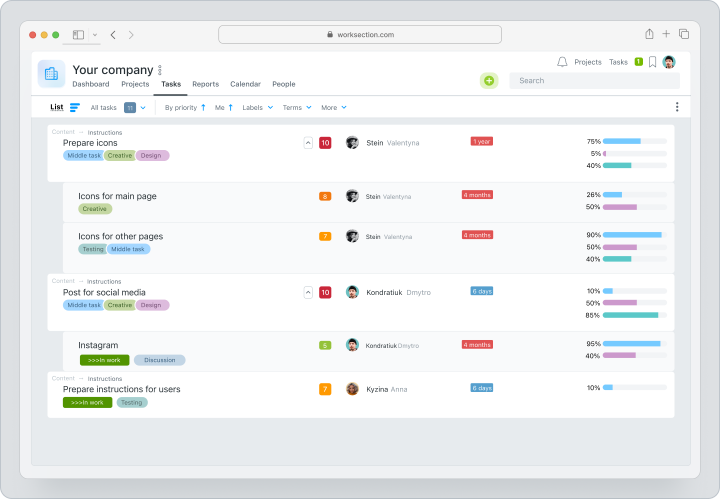
Узнайте больше на Worksection.
Monday.com
Monday позволяет командам настраивать автоматизацию, отслеживать время и эффективно организовывать задачи. Именно поэтому стартапы, стремящиеся к гибкости, получат выгоду от высоконастраиваемых рабочих процессов Monday. По мере роста стартапов, Monday.com растет вместе с ними, предлагая интеграции с Slack, Google Workspace и многими другими. Визуальное отслеживание проектов позволяет всем согласовывать цели. Monday.com ценится от 9 долларов США за пользователя в месяц, что делает его масштабируемым вариантом для стартапов, планирующих расширение.
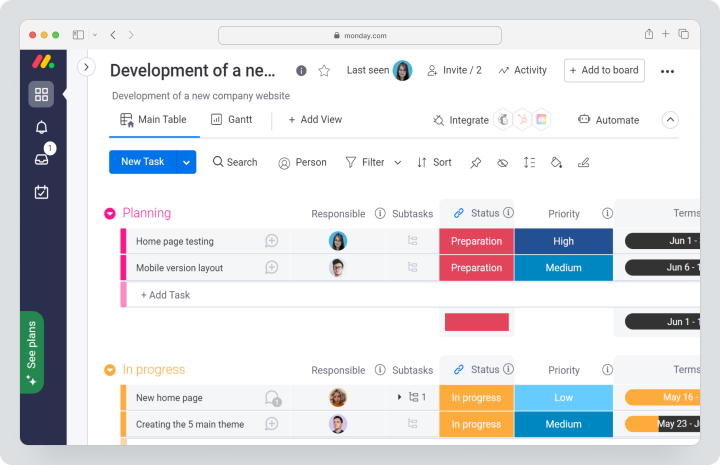
Подробнее на Monday.com.
Asana
Asana – это универсальная платформа, которая процветает в быстро меняющихся условиях стартапов. Его интуитивно понятный интерфейс упрощает отслеживание проектов, временные графики и управление задачами. Для стартапов, управляющих несколькими клиентскими проектами или спринтами разработки, возможность Asana интегрироваться с такими инструментами, как Slack и Google Drive, делает его незаменимым для оптимизации операций. Цены начинаются от 10.99 долларов США за пользователя в месяц, что делает Asana одновременно доступным и мощным инструментом управления проектами.
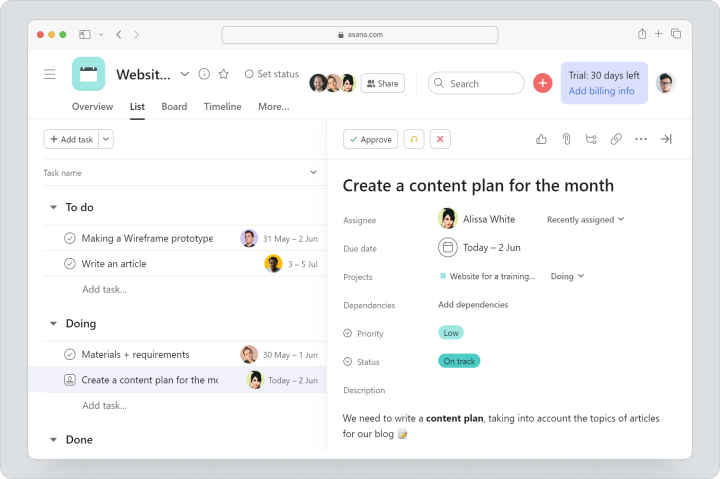
Узнайте больше на Asana.
Trello
Trello отличается простотой и идеально подходит для стартапов, которым нужно быстро настроить и легко отслеживать задачи визуально. Система доски Канбан с перетаскиванием интуитивно понятна, позволяя командам организовывать задачи, добавлять сроки и помечать приоритеты. Trello предлагает расширенные функции, такие как автоматизация и интеграции всего за 5 долларов США за пользователя в месяц.
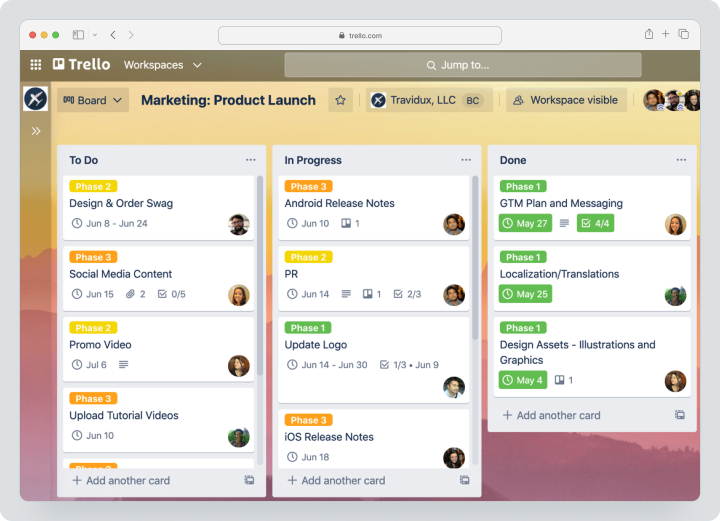
Исследуйте больше на Trello.
Wrike
Wrike выделяется для стартапов, управляющих сложными проектами с множеством заинтересованных сторон. Расширенные функции, такие как диаграммы Ганта, отслеживание ресурсов и надежная отчетность, предоставляют глубокиеInsights в состояние проекта. Wrike превосходит в области реального времени, помогая стартапам согласовать кросс-функциональные команды и эффективно выполнять сроки. Стоит от 9.80 долларов США за пользователя в месяц, что делает его отличным выбором для стартапов, ориентированных на долгосрочный рост.
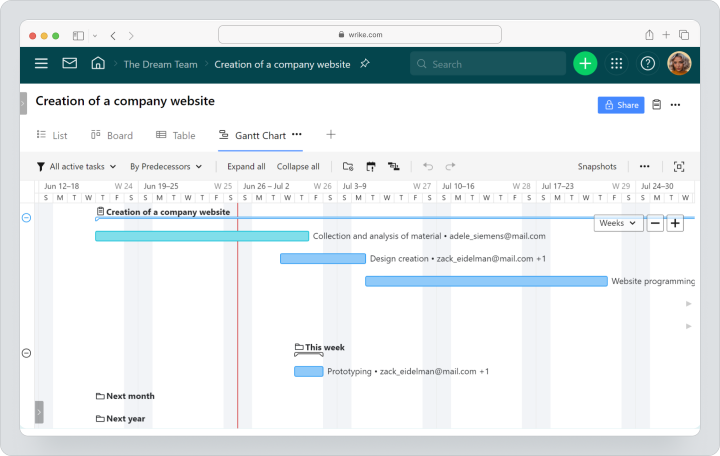
Узнайте больше на Wrike.
ClickUp
ClickUp предлагает адаптируемое решение для стартапов с его настраиваемыми представлениями и функциями автоматизации задач. Будь то управление спринтами разработки программного обеспечения или клиентскими проектами, гибкость ClickUp позволяет стартапам настраивать рабочие процессы в соответствии с конкретными потребностями. Платформа интегрируется с такими инструментами, как Slack и Google Drive, обеспечивая бесшовное сотрудничество. Цены начинаются от 7 долларов США за пользователя в месяц, что делает его экономически эффективным решением для стартапов любого размера.
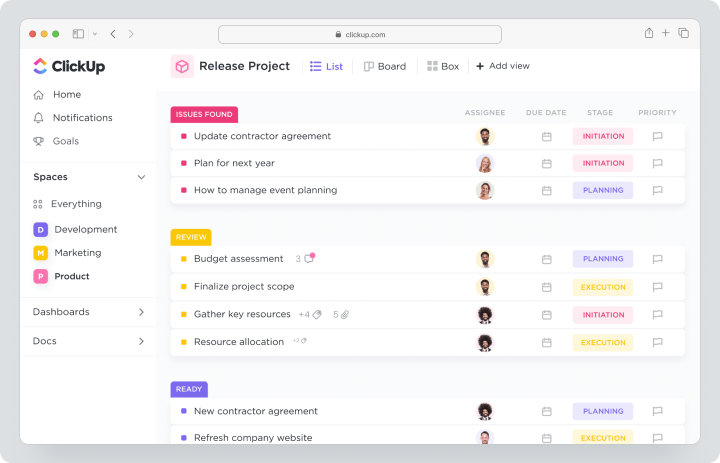
Узнайте больше на ClickUp.
Smartsheet
Smartsheet сочетает структуру электронной таблицы с мощными инструментами управления проектами, идеально подходящими для стартапов, работающих над сложными, насыщенными данными проектами. Его функции отслеживания ресурсов, автоматизации и совместной работы в реальном времени делают его идеальным для быстрорастущих команд. Smartsheet также интегрируется с популярными бизнес-инструментами, такими как Salesforce и Microsoft Office, что делает его адаптируемым решением для масштабируемых стартапов. Цены начинаются от 9 долларов США за пользователя в месяц.
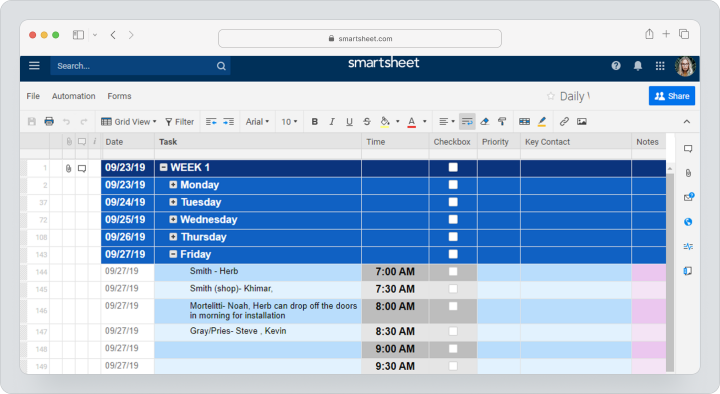
Узнайте больше на Smartsheet.
Basecamp
Basecamp упрощает управление проектами с такими функциями, как списки задач, обмен файлами и инструменты коммуникации для команды. Его удобный интерфейс идеально подходит для стартапов, стремящихся к простой платформе сотрудничества без излишней сложности. Ценовая модель начинается от 15 долларов США за пользователя в месяц. Basecamp является хорошим вариантом для малых предприятий или стартапов, которые хотят улучшить координацию проекта и сотрудничество команды. Он отлично подходит для команд, которые ставят простоту использования выше сложных функций управления проектами.
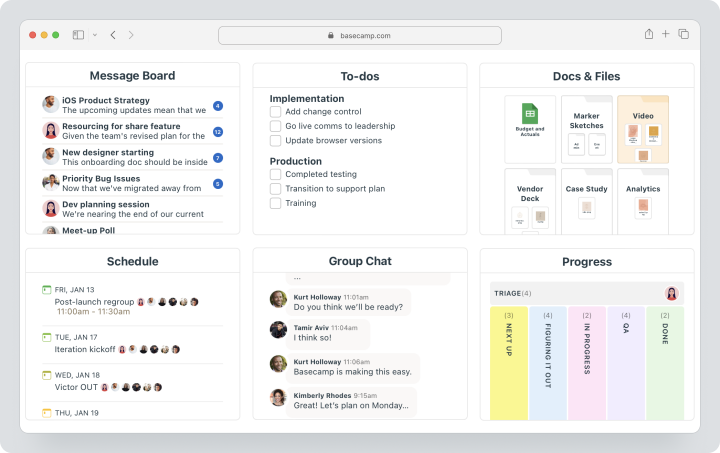
Узнайте больше на Basecamp.
Todoist
Todoist — отличное приложение для стартапов и фрилансеров, которые хотят оставаться организованными. Инструмент сосредоточен на приоритизации задач и управлении проектами, что делает его идеальным для тех, кто имеет более простые рабочие процессы. Todoist предлагает доступный способ повысить продуктивность с такими функциями, как напоминания и шаблоны, начиная с 4 долларов США за пользователя в месяц.
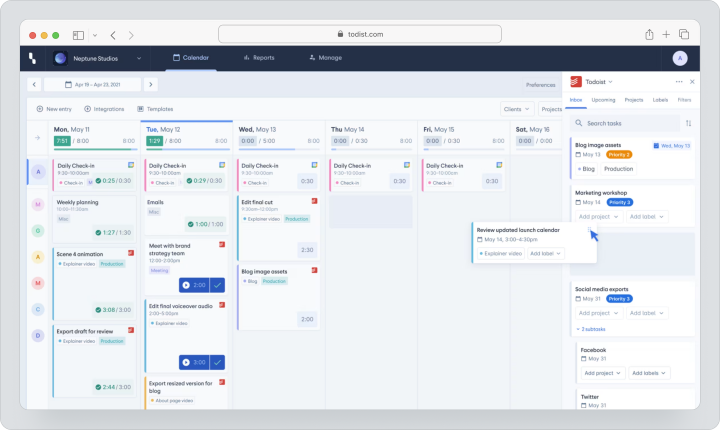
Посетите Todoist для получения дополнительной информации.
Microsoft Project
Microsoft Project лучше всего подходит для стартапов, знакомых с экосистемой Microsoft. Предоставляя мощные функции планирования, управления ресурсами и диаграмм Ганта, он помогает эффективно управлять большими и сложными проектами. Его бесшовная интеграция с инструментами Microsoft, такими как Excel и SharePoint, делает его отличным выбором для стартапов, управляющих проектами с большим объемом данных или кросс-функциональными проектами. Цены начинаются с 10 долларов США за пользователя в месяц.
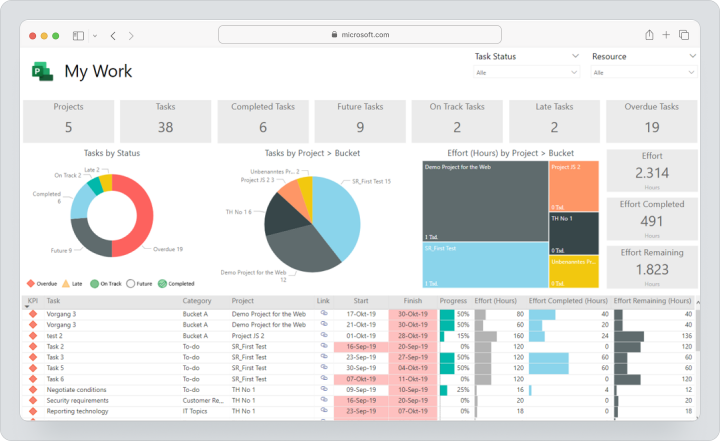
Узнайте больше на Microsoft Project.
Кому следует использовать программное обеспечение для управления проектами?
Программное обеспечение для управления проектами для стартапов имеет высокую степень настройки. Это делает его ценным для стартапов в различных отраслях.
- Технические стартапы полагаются на эти инструменты для управления разработкой программного обеспечения, организации спринтов и отслеживания отчетов об ошибках. Это обеспечивает плавный выпуск функций и эффективное сотрудничество команды.
- Для маркетинговых агентств программное обеспечение для управления проектами упрощает работу с клиентскими кампаниями, управляет сроками и распределяет ресурсы на творческие задачи, повышая продуктивность и ответственность.
- Дизайнерские команды, такие как архитектурные или графические дизайнеры, выиграют от инструментов, которые помогают управлять проектами, клиентской обратной связью и сроками, чтобы поддерживать проекты в графике.
Программное обеспечение для управления проектами для стартапов достаточно адаптируемое, чтобы удовлетворить различные потребности различных отраслей. Оно предлагает гибкость в управлении задачами, совместной работе и отслеживании сроков. Независимо от того, управляете ли вы технической компанией или маркетинговым стартапом, эти инструменты могут помочь обеспечить более гладкие операции и лучшие результаты проектов.
Интеграция программного обеспечения для управления проектами с другими инструментами стартапа
Программное обеспечение для управления проектами для стартапов становится более мощным, когда оно бесшовно интегрировано с основными инструментами, такими как Slack, Google Workspace и другим. Эти интеграции создают единый операционный процесс, позволяя командам оптимизировать рабочие процессы и централизовать все необходимые данные. Например, подключение Slack к программному обеспечению для управления проектами, такому как Asana или Worksection, позволяет получать обновления и уведомления о прогрессе задач в реальном времени, что обеспечивает информированность команд без необходимости переключаться между платформами.
Интеграция с Google Workspace обеспечивает легкий доступ к общим файлам и совместным документам. Стартапы могут связать инструмент управления проектами с Google Drive, позволяя членам команды загружать и получать доступ к важным файлам без выхода из платформы проекта. Это сохраняет все релевантные материалы в одном месте, обеспечивая, чтобы последние документы всегда были доступны для обзора.
Эти интеграции создают бесшовную экосистему, где коммуникация, сотрудничество и управление работают вместе, экономя время и повышая эффективность во всех операциях стартапа. Для стартапов такая связь необходима для поддержания гибкости и согласования между отделами.
Истории успеха на практике
При рассмотрении программного обеспечения для управления проектами для стартапов важно взглянуть на то, как успешные компании извлекли выгоду из внедрения этих инструментов. Стартапы и растущие компании могут черпать вдохновение из реальных примеров успешного внедрения программного обеспечения для управления проектами.
Например, Exoft, компания по предоставлению IT-услуг, оптимизировала свой рабочий процесс, интегрировав Jira. Этот комплексный подход улучшил коммуникацию и позволил компании более эффективно справляться со сложными потребностями клиентов, что привело к более быстрой доставке проектов и повышению удовлетворенности клиентов. Также глобальный гигант Vodafone стандартизировал свои процессы управления проектами с использованием специализированного программного обеспечения для оптимизации распределения ресурсов по своим глобальным операциям. Этот шаг улучшил видимость проектов и скорость, что в конечном итоге привело к лучшим бизнес-результатам.
Эти примеры демонстрируют, как как стартапы, так и устоявшиеся компании могут извлечь выгоду из инструментов управления проектами для решения общих проблем, таких как управление ресурсами, отслеживание задач и улучшение коммуникации. Выбирая правильное программное обеспечение, стартапы могут повысить эффективность, способствовать росту и добиться лучших результатов проектов, как это сделали эти компании.
Часто задаваемые вопросы
Стоит ли инвестировать в программное обеспечение для управления проектами для стартапов?
Да, многие инструменты, такие как Todoist и Trello, предлагают базовую функциональность, которая идеально подходит для небольших команд или отдельных лиц, стремящихся управлять несколькими проектами одновременно. Если вы хотите получить больше ценности для небольшой команды, вы также можете рассмотреть Worksection, в котором есть все инструменты управления проектами, которые вам нужны.
Может ли программное обеспечение для управления проектами помочь в управлении удаленной командой?
Да, программное обеспечение для управления проектами упрощает управление удаленной командой, предоставляя централизованную платформу, где члены команды могут общаться, обмениваться файлами и отслеживать задачи. Эти инструменты предлагают обновления в реальном времени, функции сотрудничества и интеграцию с другим программным обеспечением, таким как Slack или Zoom, что обеспечивает бесшовную коммуникацию и рабочий процесс, даже для распределенных команд.